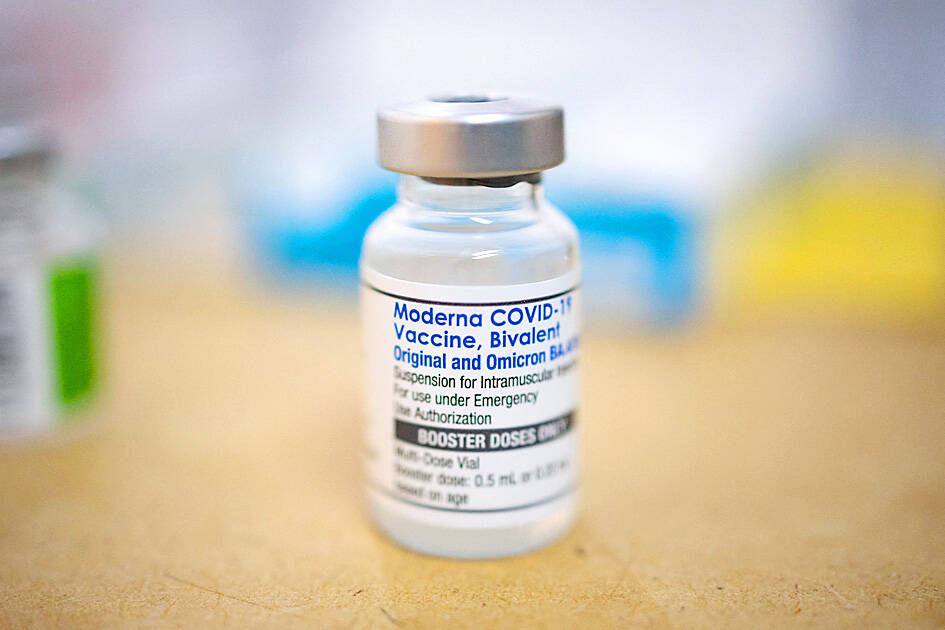Moderna Inc has refused to hand over to China the core intellectual property behind the development of its COVID-19 vaccine, leading to a collapse in negotiations on its sale in the country, the Financial Times reported on Saturday, citing people familiar with the matter.
The Cambridge, Massachusetts-based pharmaceutical company turned down China’s request to disclose the formula for its mRNA vaccine because of commercial and safety concerns, the newspaper said, citing people involved in negotiations that took place from 2020 to last year, adding that the vaccine maker is still “eager” to sell the product to China.
The company had “given up” on its previous efforts to access the Chinese market because of Beijing’s demand that it reveal the technology as a prerequisite for its sale in the country, the report said.

Photo: Reuters
China has not approved any foreign COVID-19 vaccines and relies on several domestically developed shots.
Moderna chief medical officer Paul Burton last month said the company is keen to collaborate with China on supplying its mRNA-based COVID-19 vaccines to the country.
“We would certainly be very eager to collaborate with China if they felt that there was a need for a vaccine there,” Burton told a news conference. “Currently, there is no activity going on, but we’d be very open to it.”
Moderna established a subsidiary in Taiwan on Thursday last week, as the company makes efforts to collaborate with the nation’s private and public sectors, as well as academia, the subsidiary’s general manager Joyce Lee (李宜真) said.
Meanwhile, Taiwan has since early last month received four shipments of the US company’s next-generation COVID-19 vaccine targeting the BA.4 and BA.5 Omicron subvariants of SARS-CoV-2, and local cities and counties began administering the doses on Sept. 24, the Central Epidemic Command Center said.
Additional reporting by staff writer

MULTIFACETED: A task force has analyzed possible scenarios and created responses to assist domestic industries in dealing with US tariffs, the economics minister said The Executive Yuan is tomorrow to announce countermeasures to US President Donald Trump’s planned reciprocal tariffs, although the details of the plan would not be made public until Monday next week, Minister of Economic Affairs J.W. Kuo (郭智輝) said yesterday. The Cabinet established an economic and trade task force in November last year to deal with US trade and tariff related issues, Kuo told reporters outside the legislature in Taipei. The task force has been analyzing and evaluating all kinds of scenarios to identify suitable responses and determine how best to assist domestic industries in managing the effects of Trump’s tariffs, he

TIGHT-LIPPED: UMC said it had no merger plans at the moment, after Nikkei Asia reported that the firm and GlobalFoundries were considering restarting merger talks United Microelectronics Corp (UMC, 聯電), the world’s No. 4 contract chipmaker, yesterday launched a new US$5 billion 12-inch chip factory in Singapore as part of its latest effort to diversify its manufacturing footprint amid growing geopolitical risks. The new factory, adjacent to UMC’s existing Singapore fab in the Pasir Res Wafer Fab Park, is scheduled to enter volume production next year, utilizing mature 22-nanometer and 28-nanometer process technologies, UMC said in a statement. The company plans to invest US$5 billion during the first phase of the new fab, which would have an installed capacity of 30,000 12-inch wafers per month, it said. The

‘SWASTICAR’: Tesla CEO Elon Musk’s close association with Donald Trump has prompted opponents to brand him a ‘Nazi’ and resulted in a dramatic drop in sales Demonstrators descended on Tesla Inc dealerships across the US, and in Europe and Canada on Saturday to protest company chief Elon Musk, who has amassed extraordinary power as a top adviser to US President Donald Trump. Waving signs with messages such as “Musk is stealing our money” and “Reclaim our country,” the protests largely took place peacefully following fiery episodes of vandalism on Tesla vehicles, dealerships and other facilities in recent weeks that US officials have denounced as terrorism. Hundreds rallied on Saturday outside the Tesla dealership in Manhattan. Some blasted Musk, the world’s richest man, while others demanded the shuttering of his

Taiwan’s official purchasing managers’ index (PMI) last month rose 0.2 percentage points to 54.2, in a second consecutive month of expansion, thanks to front-loading demand intended to avoid potential US tariff hikes, the Chung-Hua Institution for Economic Research (CIER, 中華經濟研究院) said yesterday. While short-term demand appeared robust, uncertainties rose due to US President Donald Trump’s unpredictable trade policy, CIER president Lien Hsien-ming (連賢明) told a news conference in Taipei. Taiwan’s economy this year would be characterized by high-level fluctuations and the volatility would be wilder than most expect, Lien said Demand for electronics, particularly semiconductors, continues to benefit from US technology giants’ effort